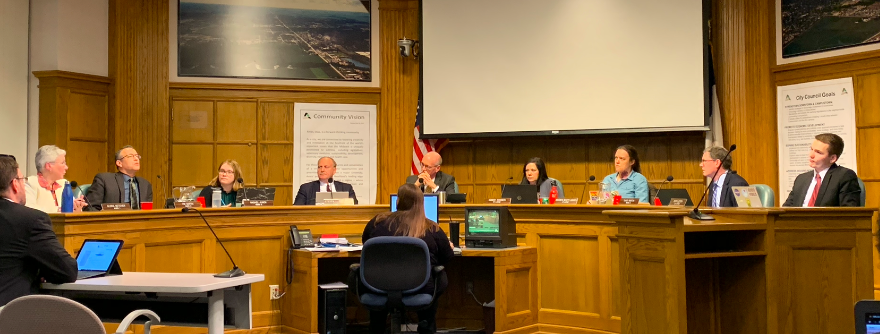Ames City Council discusses results from 2020 Resident Satisfaction survey
October 13, 2020
Ames City Council reviewed the 38th annual Ames Resident Satisfaction survey for 2020 during their regular meeting Tuesday. The overall results from the survey were fairly consistent with the last five years of the survey. This year’s survey featured two additional questions regarding the sense of community in Ames.
In April 2020, the city mailed questionnaires to 1,350 Ames residents who were randomly selected utility users, and an additional 1,000 Iowa State students were randomly selected.
From those numbers, the statistical reporter summarized the results from 844 respondents. This was higher than the results of 2019, which was 606. There were 422 individuals referred as non-student residents in the report. This year had a response rate of 31 percent for non-students and 71 percent for students.
The timing of the survey was prior to the derecho and the killing of George Floyd, and it was sent earlier on in the pandemic. Public Relations Officer Susan Gwiasda said these are significant events that were probably not reflected in the survey.
The survey is done every year prior to kicking off the budget, and it serves as a benchmark for city services as well as a tool for the council when budgeting. The survey had a 95 percent confidence rate that it is within +/-3.35 percent of the results, meaning the data found significantly reflects the responses of the total population, according to the report.
“I really do focus on the big picture elements of the survey, those benchmarking numbers of the survey,” Gwiasda said. “Those comments are really good to read. Again, they are a snapshot of a person’s perspective in time whereas the data is collected.”
One section of the survey looked at community integration and the sense of belonging, which allowed for a five-point scale. Gwiasda said the results were on the high side, which was surprising, but since this was the first year the questions were included, there is nothing to compare the statistics from 2020 to.
“When it comes to community integration and a sense of belonging, you are looking at about 80 percent of the community responding somewhat positively to those questions,” Gwiasda said. “You still have 20 percent responding, ‘No, I don’t feel as connected as I should,’ so it is really hard to know what to do [with] these numbers with the first year benchmarking category, but we are digging deeper into those to see what they mean and how we can use this data in other ways.”
Tim Gartin, 2nd Ward representative, asked if it was possible to examine how different cross-sections of the survey responded to this.
“There was a campus climate survey in terms of the level of satisfaction, and what we know is we would really love for African Americans to have a great sense of connection within the community,” Gartin said. “So it would be interesting to see if we could drill down and see if there are lessons from this survey and look at the cross-sections.”
Gwiasda said there were 769 respondents who were asked demographic questions regarding race and ethnicity, and 93 of them identified as non-white. The survey found that 84.9 percent of surveyors said the city has a strong commitment to diversity, equity and inclusion while 90.6 percent said they are treated with respect in Ames, according to the report.
“I think this is really a super tool, and if there are additional insights that those analyses provide us, that would be helpful to let us know,” Gartin said. “I am also really excited about being able to develop some longitudinal data so we can look at this next year and begin to see some trend lines over time. This going to be a really super component of our survey.”
The survey found that 56 to 86 percent of survey respondents wanted the city to spend the same on 10 on-going services; some services included on this list were the Ames Animal Shelter, art programs, park activities and land use planning.
As for property taxes, the majority of the respondents wanted to see no change in their property taxes, which have been consistent with the last five years of the survey.
The survey can be found on the City of Ames website under the city manager’s page, where you can find previous surveys as well.







